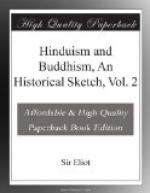“The perfume of the
sandal tree is thy incense; the wind is
thy fan; all the forests are
thy flowers, O Lord of light.”
Though Nanak is full of Hindu allusions he is more Mohammedan in tone than Kabir, and the ritual of Sikh temples is modelled on the Mohammedan rather than on the Hindu pattern. The opening words of the Japji are: “There is but one God, whose name is true, the Creator"[668] and he is regarded rather as the ruler of the world than as a spirit finding expression in it. “By his order” all things happen. “By obeying him” man obtains happiness and salvation. “There is no limit to his mercy and his praises.” In the presence of God “man has no power and no strength.” Such sentiments have a smack of Mohammed and Nanak sometimes uses the very words of the Koran as when he says that God has no companion. And though the penetrating spirit of the Vedanta infects this regal monotheism, yet the doctrine of Maya is set forth in unusual phraseology: “God himself created the world and himself gave names to things. He made Maya by his power: seated, he beheld his work with delight.”
In other compositions attributed to Nanak greater prominence is given to Maya and to the common Hindu idea that creation is a self-expansion of the deity. Metempsychosis is taught and the divine name is Hari. This is characteristic of the age, for Nanak was nearly a contemporary of Caitanya and Vallabhacarya. For Kabir, the disciple of Ramananda, the name was Ram.
Nanak was sufficiently conscious of his position as head of a sect to leave a successor as Guru,[669] but there is no indication that at this time the Sikhs differed materially from many other religious bodies who reprobated caste and idolatry. Under the fourth Guru, Ram Das, the beginnings of a change appear. His strong personality collected many wealthy adherents and with their offerings he purchased the tank of Amritsar[670] and built in its midst the celebrated Golden Temple. He appointed his son Arjun as Guru in 1581, just before his death: the succession was made hereditary and henceforth the Gurus became chiefs rather than spiritual teachers. Arjun assumed some of the insignia of royalty: a town grew up round the sacred tank and became the centre of a community; a tax was collected from all Sikhs and they were subjected to special and often salutary legislation. Infanticide, for instance, was strictly forbidden. With a view of providing a code and standard Arjun compiled the Granth or Sikh scriptures, for though hymns and prayers composed by Nanak and others were in use there was as yet no authorized collection of them. The example of Mohammedanism no doubt stimulated the desire to possess a sacred book and the veneration of the scriptures increased with time. The Granth now receives the same kind of respect as the Koran and the first sight of a Sikh temple with a large open volume on a reading-desk cannot fail to recall a mosque.




